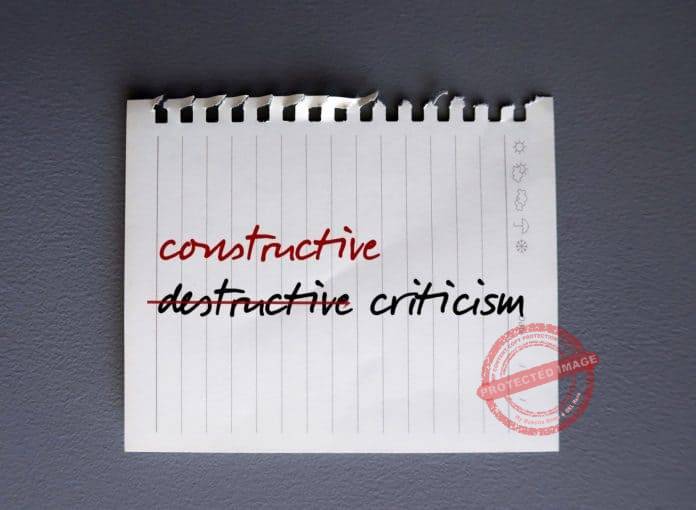When it comes to listening and accepting constructive criticism a lot of people struggle. They feel or think that being criticized is bad every time. As a result, they miss out on the benefits of listening and taking constructive criticism. This does not help anyone. So, if you don’t want to miss out, then you need to know how to take constructive criticism.
Amazing tips have been prepared for you to learn how to take constructive criticism.
However, before going to that, let’s look at some basics.
What is Constructive Criticism? – How To Take Constructive Criticism
Constructive criticisms are friendly, clear, honest, and direct comments or feedback that focus on bettering a person.
It provides clear actionable suggestions and examples that can bring about positive change.
In other words, it pinpoints ways that the receiver can implement positive change or improvement in their thoughts and behavior.
This helps the receiver have minimized future problems.
As a result of the easy-to-execute method that constructive criticism adopts, it makes it easy for the receiver to make the needed improvement.
Why Do People Rebuff Constructive Criticism – How To Take Constructive Criticism
Several people rebuff and reject constructive criticism.
They do this for the following reasons:
They Are Arrogant
Some people struggle to take criticism because they feel like they cannot make a mistake or don’t need improvement.
They feel that people should not give them any suggestions.
As a result, when they are given constructive criticism, they rebuff it.
All of these happen because they are arrogant.
If you are like this, then you should learn to be humble and listen to others to ensure that you don’t miss out on a chance to grow.
Confidence Issues
If a person has low confidence or low self-esteem, then they will struggle to take constructive criticism.
When given constructive criticism they might feel attacked.
They will feel that whatever a person says when criticizing them is personal.
So, they rather stay away than listen to constructive criticism.
This sort of people will never be ready to take constructive criticism until they understand that it is not aimed to attack but point out shortcomings and give suggestions to get better.
If you are like this you need to deal with your confidence issues.
Perception Differences/ Lack of Self-awareness – How To Take Constructive Criticism
Another reason why people rebuff constructive criticism is because of differences in perception.
What this means is that some people struggle to see things the way others see them.
They do not see themselves like the way the other person says in their feedback.
When you lack the right perceptive and not are self-aware, you will struggle to listen when someone tells you otherwise about yourself.
This is what happens to some people.
If you are like this, then you need to work to improve your self-awareness.
When you do this, you will be able to tell if what someone is saying about you when making constructive criticism is true or not.
This way, you will be open to listening to them.
They Think Criticism is All Bad
When some people hear the word “criticism” they are up and run away.
This is because they feel that every criticism is bad.
Hence, when someone approaches them to provide constructive criticism, they close off.
This doesn’t help them to grow.
If you are like this, you need to know and understand that criticism is not all bad.
Constructive criticism goes a long way in improving you.
So, be open to them.
Lack Of a Growth Mindset – How To Take Constructive Criticism
Although it is considered unwise to be nonchalant towards growth, some certain people are.
One reason for this is that they lack a growth mindset.
They don’t believe that improvement is possible.
These people are so fixed and satisfied with what they already know or have, that they are not interested in having more or getting better.
Hence, they struggle to take constructive criticism.
When people are this way they limit themselves from reaching their full potential or achieving their goals.
If you are like this, you need to learn to open up to change.
Change your mindset for the better and become a better person.
Laziness To Make Improvement
Some people might not have a fixed mindset but they are lazy to do anything or make sacrifices for growth.
As a result, when they are approached with constructive criticism, they tend to rebuff.
They rather keep being the way they are than put in the effort to become better.
If you are like this, then you need to help yourself by building yourself to be someone willing to pay the price for improvement and success.
You will not only be missing out on the opportunity for growth that constructive criticism brings but other amazing opportunities
The Differences Between Constructive Criticism and Non Constructive Criticism
Several people don’t know that not all criticism is bad.
They don’t know and believe that criticism can work positively for them.
So, they struggle to take constructive criticism
However, if they come to understand that there are constructive and non constructive criticism they will be more open to constructive
In other words, you need to understand that criticisms are not bad at all times.
You just need to know which one is bad and good.
This way you will know not to struggle to take good constructive criticism when it comes
To do this, you need to know the difference between constructive criticism and non constructive criticism.
Non constructive criticism is the opposite of constructive criticism as they don’t help a person get better.
Rather they work to destroy someone with negative comments without actionable and specific suggestions.
They are sometimes considered to be personal attacks as they work to destroy a person’s self-esteem through hypercriticism and needless focusing on minor details.
When criticisms are having these features, then you should avoid them.
However, when they are not, then you should be open to listening to them.
The Benefits of Taking Constructive Criticism – How To Take Constructive Criticism
Here are some amazing benefits of taking constructive criticism;
It Encourages Growth – How To Take Constructive Criticism
When you can take constructive criticism, you encourage yourself to grow.
It helps you to see where you need work and gives you creative and better ideas on how to make improvements.
When you make use of the suggestions that are provided, you will reach your potential and break out of your comfort zone.
Rebuffing constructive criticism will only keep you repeating your errors and give you no opportunity to grow.
So, taking constructive criticism should be something you do.
It Reduces Stress Level
When you can take constructive criticism you will know where you are lacking and how you can do better.
This will reduce any tensions that you might have when you question if you are doing well or not.
As a result, your stress level will reduce.
And instead of stress, you will focus your energy on becoming better.
It Works As An Energy Boost – How To Take Constructive Criticism
When you know how to take constructive criticism you will know to appreciate people’s feedback.
You will appreciate that they saw you not doing your best and willingly offered their help to you to get better.
This can make you see that they value you, want you to be better, and also believe in you to make the needed improvement.
So, it can serve as an energy boost for you and encourage you to put in the needed effort to get better.
It Helps You To Know Your Foes or Friends
When you take constructive criticism, you will know the difference between constructive criticism and non constructive criticism.
As a result, you will know the people who want to see you grow and who don’t.
This way, you can help avoid the wrong people and build good relationships with the right people.
It Helps to Deal With Perfectionism
Not everybody is a perfectionist.
However, at one point or the other in people’s lives, they tend to expect perfection
This can make them paint unreal pictures and expect impossibilities.
As a result, they get trapped and end up not doing their best.
However, when they are receptive to constructive criticism it helps them to see things for how they are, and focus on doing the right things as best as they can.
It helps them to see their flaws and faults and also to address and better them.
Tips on How To Take Constructive Criticism
Different people struggle to take constructive criticism.
Some people struggle because they take things personally.
Meanwhile, some struggle because they don’t know the difference between constructive and deconstructive criticism.
Whatever your reason is, the fact remains that taking constructive criticism does not hurt you but helps you become better.
So, if you are ready to embrace constructive criticism, here are some great tips that will help you do this:
1. Be Careful of Your Facial Expression and Reaction
People who don’t take constructive criticism either fight or flight.
In other words, when they are provided with constructive criticism they are out to avoid or out rightly reject it.
This behavior trait does not allow them to give feedback a chance.
Oftentimes, they demonstrate rejection of the constructive criticism by making facial expressions such as rolling their eyes, frowning, or just ignoring the person.
Yes, it is not easy to keep a welcoming and friendly face when you are told of your shortcomings.
It is considered normal for you to react immediately.
However, doing this will not help you.
This is because it can make people unwilling to share their good and helpful suggestions with you.
So, try keeping a friendly face instead of reacting immediately.
If you cannot, then you can try keeping a blank face.
To avoid an outburst, ensure that you take in deep breaths and stay calm.
Show the speaker that you’re interested in what they have to say.
This way, they will be more open to speaking more with you.
2. Keep A Welcoming Body Language
Apart from having a welcoming facial expression, you also need to keep a welcoming body language.
This is because the way you carry yourself can be a message to the speaker about how interested you are in what they are sharing.
So, to avoid giving the wrong message, ensure that you focus on your body language.
Don’t cross your arms or slouch when they are speaking.
Also, avoid nervous gestures or movements as they are considered to be negative signals that can make the speaker close off.
So, instead of doing all of that ensure that you keep a confident and tall stance with your arms open.
When the speaker sees you standing like this, they will know that you are interested and speak freely with you.
3. Listen Well Before Speaking
When you speak while the speaker is still speaking it can be considered as being rude.
So, rather wait till the speaker finishes speaking before saying anything.
While you are waiting, you have to ensure that you are listening well.
If you don’t listen well to what the speaker is saying, you will not get their message well.
And when this happens you will not be able to make use of whatever they shared with you.
So, listen well to understand the speaker without arguing or interrupting.
Even if you have anything to say don’t, keep it in to avoid starting an argument.
This way, you will save your energy and time, and use it to connect better with the speaker.
Also, it will be easier to apply whatever you hear from the speaker.
The speaker might not be able to tell if you’re listening or not and this might discourage them.
So, you should show them that you’re listening by keeping eye contact, nodding your head, and making encouraging sounds or words.
This way, communication will flow more smoothly.
Check here to discover how to improve your listening skills.
4. Appreciate the Speaker – How To Take Constructive Criticism
Whoever provides you with constructive criticism are people who want you to grow.
They are doing a huge favor for you.
Not everybody can do that.
So, you should be appreciative of them.
When they shared their feedback with you, ensure that you say “thank you”.
Those simple words can go a lot way in making them happy and become more interested in your growth.
As a result, they will not fail in providing positive feedback and criticism when you need it.
Furthermore, appreciating people who provide you with constructive criticism can lead to a strong and beneficial relationship with them
5. Remember The Benefits Of Constructive Criticism
When you feel drawn back when listening to constructive criticism, remember that it doesn’t hurt.
Focus on the suggestions they are sharing and how you can make use of their suggestion and other things to get better.
Rather than thinking of all the negative words that you think the other person might say
At all times, remind yourself that there are great benefits when you take constructive criticism.
This way you will be more relaxed and embrace the feedback you are getting.
6. Don’t Take It Personal
As you are keeping the benefits of taking constructive criticism in mind, you need not take things personally.
In other words, don’t feel like the speaker is attacking your person.
However, you should know that if you don’t hear the truth you will not be able to grow.
This is because you will not know where you are lacking.
So, no matter how painful the truth is, you should consider listening to it and not taking personally.
Since it is constructive criticism, the speaker will not dwell much on how you are failing but on how you can become better.
Therefore, stay calm and listen to them.
Sometimes when people take criticism personally is because they lack confidence or have low self-esteem.
So, look within yourself and check if this is what is happening with you.
If it is, then you should work to improve your confidence and self-esteem.
7. Ask Questions Without Being Challenging
When the speaker has finished speaking, you can then ask questions to clarify things.
However, while doing you need to avoid sounding challenging.
You also should not refute the person’s feedback.
To ensure that you don’t sound challenging, you should watch your tone and sincerely ask for suggestions or further information.
Ensure that the conversation stays engaging and open.
8. Seek Another Opinion – How To Take Constructive Criticism
If you are not pleased or satisfied with the suggestion or the opinion of the speaker, then you can see another opinion.
Doing this doesn’t mean that you don’t appreciate that person.
It only shows how seriously you took the feedback.
Whoever you seek another opinion from should be someone who you trust and who will be honest with you.
This way, they won’t lie to you.
9. Decide If You Would Use The Feedback or Not
You get to decide if constructive criticism will work for you.
In other words, you are to decide if you would make use of the feedback given to you.
Don’t be fast in accepting the feedback people provide you.
Ensure that you access the suggestion and see if it will be beneficial for your growth.
If you decide that it is not, then that’s your choice.
However, if you know you were given a good suggestion and want to make use of it, then do that.
10. Take Steps to Become Better
If you see that you need improvement and the suggestion given to you is workable, then take steps to become better.
You can write out where you are lacking and also set goals and objectives that will lead to your improvement.
Commit to your growth.
When you become better and the person who provided the feedback sees the improvement, they will be encouraged and happy for you.
This will make them more interested in seeing more growth from you.
Conclusion on How To Take Constructive Criticism
Criticism is not all negative.
This is especially true when it is constructive criticism that aims to make you a better individual.
Therefore, you should be willing and open to taking constructive criticism.
When you do it will not only encourage growth but reduce stress level, serves as an energy boost, and help you to build strong relationships with good people.
If you don’t know how to take constructive criticism, then you should follow the tips we provided and open yourself up for growth.









